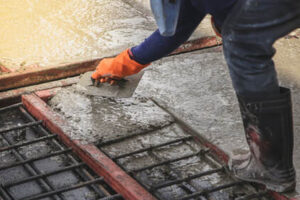Concrete Contractor can build and repair all kinds of concrete structures. They are skilled at creating sturdy concrete structures that withstand the elements and wear and tear.

They are also skilled at creating a solid concrete foundation for walls, floors, and other projects. This ensures that your project is done well and lasts for a long time.
When it comes to working with concrete, experience counts. This is particularly true of commercial concrete contractors, who often work on projects ranging from new construction structures to office buildings and strip malls. They must have extensive knowledge of the various types of concrete, their properties, and how to best use them. This expertise is essential in ensuring that projects are completed correctly and on time.
During your search for the right contractor, ask about their experience in the industry and the types of projects they’ve handled. You should also ask whether they use subcontractors and how they manage their crews. A top-notch contractor will have a well-organized process and clearly define the responsibilities of each team member. This will help to prevent confusion and ensure that the project is completed on time and within budget.
Another important consideration is the quality of the materials used by the contractor. Look for a company that utilizes high-quality, industry-standard concrete and reinforcement materials and maintains modern equipment tailored to the needs of each project. Lower-quality materials can compromise the durability and aesthetics of your finished project.
It is also important to know whether the contractor has the necessary permits for your project. Not all work requires a permit, but for those that do, it’s critical to have a contractor who knows the process and is familiar with local building codes. A reputable contractor should be able to provide you with a list of any permits required for your project and explain the process for obtaining them.
Choosing the right concrete contractor is an essential decision that will have a significant impact on your project’s success. By focusing on the right things – experience, legitimacy, reputation, pricing transparency, communication, and material quality – you can make an informed decision that will lead to a successful project and peace of mind. So be sure to take the time to verify a contractor’s licensing, insurance, and certifications before making a hiring decision. This will ensure that the job is performed to your standards and that you are protected in the event of an accident or property damage.
License
Concrete is a heavy material that requires the expertise of a professional to work with. This includes knowing how to mix the right ratio of water, aggregate (such as rock, sand, or gravel), and cement to create a strong piece of concrete. It also requires an understanding of physics and engineering, and how to correctly place concrete on a construction site so that it doesn’t sink or settle.
A concrete contractor has all of these skills and more, making them a valuable addition to any project that involves concrete. They can help design the project, pour the concrete, and finish it correctly. Concrete contractors can also help with other aspects of construction, such as preparing the site, digging holes, and installing forms.
If you’re interested in becoming a concrete contractor, it’s important to understand what the requirements are for your state. Each state has its own set of licensing requirements, including passing an exam, submitting documentation, and showing financial capability.
You can find out more about the licensing process for concrete contractors by visiting the website of your local state board. There are often workshops and webinars offered by the board that can help you prepare for the exam and learn more about the specifics of your state’s licensing requirements.
Once you have your license, you can begin working as a concrete contractor. Typically, concrete contractors work for general construction companies as subcontractors, but they can also own their own company. Being a contractor requires a wide range of skills, including business administration and finance. This means that you must be able to manage a business and make decisions regarding hiring, accounting, and bidding.
Commercial concrete contractors are specialized professionals who provide a variety of services related to the construction and repair of concrete structures for businesses. These include installing and repairing concrete foundations, floors, driveways, and other structures. These contractors are able to meet the unique needs of each client and create high-quality, long-lasting structures that will enhance the appearance of any building. In addition, commercial concrete contractors can assist with building and repairing existing concrete structures in offices, retail spaces, warehouses, and other commercial buildings.
Insurance
Concrete contractors are exposed to a lot of property damage and injury risk. Some clients may refuse to hire a business without insurance and some insurance coverage is required by law in specific industries. The best concrete contractor insurance can help cover legal fees, medical payments, the cost of replacing stolen equipment, and other financial losses that can occur during the course of your work.
Many insurance companies have streamlined the process of purchasing concrete contractor insurance online. You can purchase a policy in just minutes and have access to the documents and insurance certificates immediately after purchase. You can also use self-service tools to pay premiums, add an additional insured, and file claims.
The main type of insurance that most concrete contractors need is general liability. This type of insurance covers damages that you or your employees cause to third parties during the course of working on a job. It is often required by most general contractors before allowing you on the site.
Most general liability policies will also include medical payments coverage which pays for medical bills for third parties who are injured by your work. The maximum limit of this type of coverage is usually quite low, but it helps with the costs associated with minor injuries. Bodily injury liability coverage is another common addition to concrete contractor insurance policies. This type of coverage covers damages caused by a physical or emotional injury to a third party.
Workers’ compensation insurance is another important part of any concrete contracting insurance policy. It covers the medical expenses and lost wages of your employees if they are injured while working on the job.
Commercial property insurance is a great way to protect the building and inventory of your concrete company. This type of policy can also be bundled with general liability for greater savings.
It is a good idea to get a quote for a concrete contractor insurance from several different insurers. This will allow you to compare the terms and conditions of each policy and select the one that is best suited for your needs.
Portfolio
Concrete is the most used construction material, and concrete contractors work with it daily to build walls, roads, and floors for homes and businesses. This highly in-demand profession requires analytical, creative and leadership skills to bring an idea from concept to completion.
Besides the concrete work, a successful Concrete Contractor will be proficient at running his or her business – hiring employees, negotiating with clients and estimating projects. This knowledge can be gained through formal business education or by working as a subcontracting business owner for several years.
In addition to the above qualifications, a quality concrete contractor must have a portfolio of finished work that proves his or her skills. This can be a website that customers can view on their own or a collection of project photos to share with clients during in-person meetings. It is also helpful to showcase any industry partnerships or accolades that can provide additional credibility.
Another way that a concrete contractor can manage their business more efficiently is with resource management software which is built for subcontractors and allows contractors to track everything from employee scheduling to estimating and bidding. This software helps concrete companies optimize their operations and save money by streamlining processes such as time tracking, cost-to-complete reporting and labor efficiency analysis. To learn more about how to improve your concrete business operations, check out our free demo of the software!

